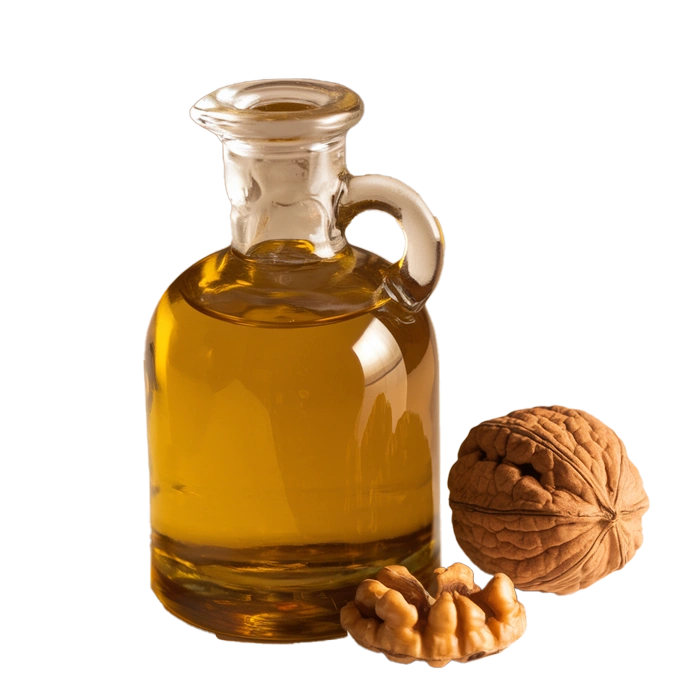
Nutritional properties of wallnut oil
Energy :
None Kcal / 100g
Category : Oils and Fats
Group : Vegetable Oils & Fats
Composition And Nutritional Value :Walnut oil is made by pressing the seeds of walnuts and is considered one of the most nutritious oils due to its rich content of polyunsaturated fatty acids, particularly omega-3 fatty acids, with a notable amount of alpha-linolenic acid (ALA). It also contains monounsaturated fats, primarily oleic acid, as well as saturated fats in smaller amounts. Walnut oil is a rich source of vitamin E, especially gamma-tocopherol, which is an antioxidant. Additionally, walnut oil contains minerals such as magnesium, phosphorus, and potassium, which contribute to overall health. Walnut oil is typically used in cold preparations to preserve its nutritional benefits.
Health Benefits :
Heart Health: The high content of omega-3 fatty acids in walnut oil, particularly alpha-linolenic acid (ALA), supports heart health by helping to reduce cholesterol levels and lowering the risk of heart disease. The monounsaturated fats also improve vascular health and support healthy blood circulation.
Anti-Inflammatory: Walnut oil is known for its anti-inflammatory properties, which help reduce inflammation in the body, potentially benefitting people with conditions like arthritis or inflammatory bowel disease.
Skin Health: The oil’s vitamin E and antioxidants make it an excellent choice for promoting healthy skin. It helps moisturize and protect the skin, reduce fine lines, and prevent oxidative damage from free radicals. It is commonly used in skincare products for its nourishing and soothing effects.
Brain Function: Due to its rich content of omega-3 fatty acids, walnut oil may have positive effects on cognitive health, including improving memory, mood, and overall brain function. It may help reduce the risk of neurodegenerative diseases such as Alzheimer's disease.
Antioxidant Protection: Walnut oil is packed with antioxidants that help neutralize harmful free radicals in the body, which could protect against chronic diseases, improve immune function, and slow down the aging process.
Culinary Uses : Walnut oil has a rich, nutty flavor and is often used as a finishing oil or in dressings, particularly in salads and vegetable dishes. It is also ideal for baking or drizzling over pasta, roasted vegetables, or grilled meats for added depth of flavor. Due to its relatively low smoke point (about 320°F or 160°C), walnut oil is not ideal for high-heat cooking like frying or sautéing but can be used in low-heat applications or added to dishes after cooking. Its flavor is quite distinctive, so it pairs well with other mild-flavored oils or can be enjoyed on its own in recipes that highlight its nutty taste.
Types :
Cold-Pressed Walnut Oil: This type of walnut oil is considered the highest quality, extracted by pressing walnuts without the use of heat. It retains the full spectrum of nutrients and flavors and is typically used in raw or cold preparations like dressings or drizzled over dishes.
Refined Walnut Oil: This oil has been processed to remove impurities and typically has a lighter flavor and higher smoke point, making it suitable for cooking at moderate temperatures. However, refining may reduce some of the oil’s nutritional value compared to cold-pressed versions.
Organic Walnut Oil: Made from organically grown walnuts, this variety is free from pesticides and synthetic chemicals, making it a great choice for health-conscious consumers.
Flavored Walnut Oil: Some walnut oils are infused with additional flavors like garlic, rosemary, or thyme. These flavored oils can be used to enhance specific dishes and add complexity to the flavor.
Shopping And Storage Tips :
Selecting Walnut Oil: Always opt for cold-pressed walnut oil to get the most flavor and nutritional benefits. When possible, choose organic walnut oil to avoid potential exposure to pesticides or chemicals.
Storage: Walnut oil should be stored in a cool, dark place away from heat and sunlight to prevent it from becoming rancid. Keep the oil in a dark glass bottle to help protect it from light exposure.
Shelf Life: Walnut oil typically lasts 6 to 12 months when stored correctly. Be mindful of the expiration date and ensure the bottle is tightly closed to prevent oxidation.
Freezing: For long-term storage, walnut oil can be placed in the freezer to extend its shelf life. Make sure to keep it tightly sealed and use it within 12 months after freezing.
Usage Tips: Due to its distinctive flavor, walnut oil should be used sparingly. It is most commonly used in dressings, as a finishing oil, or as an ingredient in baked goods or sauces to provide a rich, nutty undertone. Avoid using it for high-heat cooking, as it may lose some of its beneficial properties.

